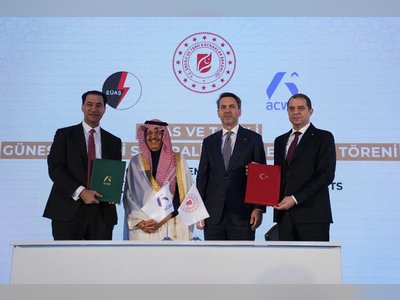
Starlink: Sudanese Town's Lifeline Amid Internet Blackouts Amid War
In the Sudanese town of Tamboul, residents rely on illegal Starlink satellite dishes to access the Internet amidst regular outages caused by the country's ongoing war.
These dishes, which connect to Elon Musk's SpaceX rocket company's satellite system, have been smuggled into Sudan from Libya, South Sudan, and Eritrea.
However, the cost of these dishes and subscriptions is prohibitively expensive for most Sudanese residents.
The text describes how people in Sudan, including entrepreneurs like Mohamed Bellah and displaced individuals like Issam Ahmed, are turning to Starlink, a satellite internet service, due to the collapse of the banking system and power outages caused by the ongoing conflict between the army and the Rapid Support Forces.
The fees for using Starlink are being paid by Sudanese overseas, and users believe they can make their money back quickly.
The text mentions that the conflict has displaced millions and caused thousands of deaths, and that the banking system has collapsed, leaving people reliant on the Bank of Khartoum's app for access to money.
The cause of the power outages is not explicitly stated, but they are widely blamed on the RSF.
Ahmed, a Sudanese man, used Starlink, a satellite internet service provided by SpaceX, to receive money sent through a bank app and then exchanged it for cash with a currency dealer.
Starlink, which is available in over 70 countries, has been used in war-torn areas like Ukraine and during protests in Iran.
However, SpaceX has not made any gestures to provide the service in Sudan, where the government banned Starlink devices in December.
Instead, the Sudanese rebel group, RSF, has been exploiting the situation by charging residents for access to their own Starlink dish in the village of Qanab Al-Halawein.
The RSF sets up the dish in the village square every day and takes all the money they make from providing the service.
SpaceX has not responded to AFP's requests for clarification on the situation in Sudan.
An Internet cafe owner in a Sudanese village reportedly paid 150,000 Sudanese pounds ($140) daily to RSF personnel to offer Starlink satellite internet service, despite a military ban.
The army later donated some Starlink dishes to residents in Omdurman but areas in Darfur, home to around 12 million people, have been without internet connection for nearly a year.
Starlink use has spread rapidly in the region controlled by the RSF, and people rely on it to receive money.
Arij Ahmed, a 43-year-old Tamboul resident, pays $3 an hour for internet connection through Starlink and additional commissions for every Bankak transaction.
Desperate situations force her to make these payments, as she and her 12-year-old son walk five kilometers weekly to access the dish.
They rely on her husband's paycheck from Qatar for the funds, hoping to survive until the next connection.
However, the cost of these dishes and subscriptions is prohibitively expensive for most Sudanese residents.
The text describes how people in Sudan, including entrepreneurs like Mohamed Bellah and displaced individuals like Issam Ahmed, are turning to Starlink, a satellite internet service, due to the collapse of the banking system and power outages caused by the ongoing conflict between the army and the Rapid Support Forces.
The fees for using Starlink are being paid by Sudanese overseas, and users believe they can make their money back quickly.
The text mentions that the conflict has displaced millions and caused thousands of deaths, and that the banking system has collapsed, leaving people reliant on the Bank of Khartoum's app for access to money.
The cause of the power outages is not explicitly stated, but they are widely blamed on the RSF.
Ahmed, a Sudanese man, used Starlink, a satellite internet service provided by SpaceX, to receive money sent through a bank app and then exchanged it for cash with a currency dealer.
Starlink, which is available in over 70 countries, has been used in war-torn areas like Ukraine and during protests in Iran.
However, SpaceX has not made any gestures to provide the service in Sudan, where the government banned Starlink devices in December.
Instead, the Sudanese rebel group, RSF, has been exploiting the situation by charging residents for access to their own Starlink dish in the village of Qanab Al-Halawein.
The RSF sets up the dish in the village square every day and takes all the money they make from providing the service.
SpaceX has not responded to AFP's requests for clarification on the situation in Sudan.
An Internet cafe owner in a Sudanese village reportedly paid 150,000 Sudanese pounds ($140) daily to RSF personnel to offer Starlink satellite internet service, despite a military ban.
The army later donated some Starlink dishes to residents in Omdurman but areas in Darfur, home to around 12 million people, have been without internet connection for nearly a year.
Starlink use has spread rapidly in the region controlled by the RSF, and people rely on it to receive money.
Arij Ahmed, a 43-year-old Tamboul resident, pays $3 an hour for internet connection through Starlink and additional commissions for every Bankak transaction.
Desperate situations force her to make these payments, as she and her 12-year-old son walk five kilometers weekly to access the dish.
They rely on her husband's paycheck from Qatar for the funds, hoping to survive until the next connection.
Translation:
Translated by AI











